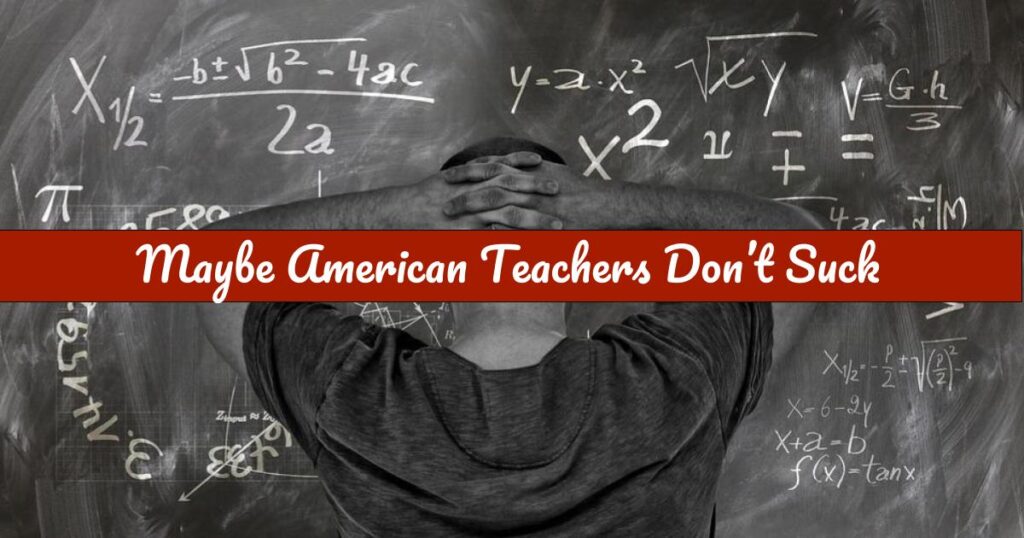
Could it be? Is it even possible? Are American teachers actually good at what they do?
Education reformers would have you believe that they are not. Not by a long shot. Their evidence? Student test scores. After the results of the 2009 PISA test were released, Head Reformer Arne Duncan, sounded the alarm:
“The chief reason that U.S. students lag behind their peers in high-performing countries is not their diversity, or the fact that a significant number of public school students come from disadvantaged backgrounds. The problem, OECD concludes, is that “socioeconomic disadvantage leads more directly to poor educational performance in the United States than is the case in many other countries.”
Our schools, in other words, are not doing nearly as much as they could to close achievement gaps. As schoolchildren age in America, they “make less progress each year than children in the best-performing countries,” according to the OECD.”
He then pointed the finger squarely at our dumb teachers, writing:
“The United States has a lot to learn from South Korea, Singapore, and Finland about building the teaching profession and recruiting teachers from the ranks of top students.”
Reformers are convinced that if we just had better teachers, those middling test scores would skyrocket. In their minds, the two are conjoined, which means that since our scores aren’t very good, then our teachers must not be either. That belief explains why critics are up in arms at the end of every school year when the evaluation systems they were so sure would lead to legions of teachers being fired instead reveal that principals think almost all of their teachers are pretty good.
Their frustration and bafflement are palpable, with headlines like:
Schools Rate Almost No Teachers Ineffective
Michigan School Districts: We Have No Ineffective Teachers
Even After Colorado’s Teacher Evaluation ‘Revolution’ Fewer Than 1 in 1,000 Rated Ineffective
Brookings was so discouraged that they claimed that “Teacher Observations Have Been a Waste of Time and Money.” (They’re right.)
There are only two possible explanations for why more teachers aren’t rated ineffective. Either principals are giving high marks to undeserving teachers, or principals know what they’re doing and teachers don’t, in fact, suck.
We know what the reformers believe.
While critics of American education base their opinions of teachers on test scores, there are other ways to evaluate people. I can study the statistics of my favorite baseball team, but I can also watch them play.
And of course, not everybody cares about test scores. As a parent, I don’t judge my child’s teacher on my kid’s test results. Evidently, I’m not alone. Because when we ask the American public what it thinks about teachers, we learn that:
–79% of parents are satisfied with the education their oldest child is receiving. (Source)
–The public believe that just 15% of teachers are unsatisfactory. (Source)
–77% of Americans trust and have confidence in America’s teachers. (Source)
–Americans rank teachers behind only nurses and military officers on questions of ethics and honesty. (Source)
These numbers are remarkable. In spite of well-funded, incessant attacks, three in four Americans still have confidence in teachers, trailing only nurses as a profession. That’s pretty good company.
But you protest. What does the American public know? Half of them don’t even know where New York is.
What about teachers themselves? If anyone should be able to accurately assess teachers, it’s other teachers. So how do teachers rate others in their profession?
According to a 2017 EdNext Poll, teachers rate the performance of 11% of other teachers as unsatisfactory.

While that’s more than districts identify, it still means that teachers, who should know effective teaching when they see it, believe that 89% of their colleagues are getting the job done.
Recognizing that teachers might be the most honest evaluators, a few school districts have experimented with Peer Assistance and Review (PAR) programs, where mentor teachers work with and evaluate fellow staff members. A review of the Columbus, Ohio PAR program shows that of the 5,861 participating teachers, 9.5% either resigned or were let go. In Cincinnati, dismissal rates ranged from 2.9% to 7% between 1997 and 2001. Rochester terminated 8% to 12% of new teachers between 1998 and 2003. (Source)
So although teachers judge their colleagues more harshly than principals do, they still conclude that about 9 in 10 teachers ought to keep teaching.
Well fine. All these adults think a very small percentage of teachers should be removed from classrooms. But what about the kids? Surely, the kids ought to be the fairest judges. They’re the ones having to put up with teachers’ uncaring attitudes and ineptitude. They spend every day with them! It’s their opinion that should count the most!
The website Ratemyteachers.com has been collecting students’ opinions of their teachers for a number of years now. Students can hop on there, and, in seconds, rate their teachers on a 1-5 scale, with 5 being the highest. So what do American students think of their teachers?
The average rating for a teacher on the site is 4.45.
Millions of students have spoken out and they seem to think their teachers do not suck.
–Parents think the great majority of teachers do a good job.
–Principals think very few teachers are ineffective.
–Teachers conclude that about 90% of their colleagues are good at their jobs.
–Students rate most of their teachers highly.
Maybe the rest of us should believe what everybody except the people who base their evaluations on test scores and who have a poorly concealed agenda to dismantle public schools have to say.

